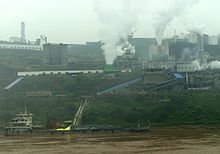Pollution haven hypothesis
The pollution haven hypothesis posits that, when large industrialized nations seek to set up factories or offices abroad, they will often look for the cheapest option in terms of resources and labor that offers the land and material access they require.
One study found that environmental regulations have a strong negative effect on a country's FDI, particularly in pollution-intensive industries when measured by employment.
This same transfer of polluting firms through trade and foreign investment could lead to the decrease in environmental degradation seen in downward-sloping section of the EKC, which models post-industrial (service) economies.
[4] Spent batteries that Americans turn in to be recycled are increasingly being sent to Mexico, where the lead inside them is extracted by crude methods that are illegal in the United States.
In this sense, Mexico is becoming a pollution haven for the United States battery industry because Mexican environmental officials acknowledge that they lack the money, manpower, and technical capacity to police the flow.
Foreign companies will relocate factories to operate in areas where there is minimal environmental regulations, saving money on waste disposal and labor.
Informal recycling operations led to significant environmental contamination, with water samples showing lead levels 190 times higher than World Health Organization safety standards.
Mitsubishi is one of the top Japanese company that makes vehicles and their cars are manufactured in many countries like Japan, Thailand, Indonesia, China, the Philippines, Vietnam, and Russia.
The compliance costs stemming from these regulations, however, could come in the form of environmental taxes, regulatory delays, the threat or execution of lawsuits, product redesign, or emissions limits.
For example, studies have found statistically significant evidence that countries with poor air quality do have higher net factor exports of coal, but the magnitude of the impact is small relative to other variables.



